Table of Contents
How much will the water heater repair cost?
(2025 Update): 95% of the time, the main reason people call about a water heater problem is leakage, which is not repairable and we must replace it. The typical range for water heater replacement is between $1600 to $5500, averaging around $3,550. For the rest of the cases, the price tag on your electric water heater repair project, one of the most critical aspects, will be the specific part that requires work. The average cost of repairing a water heater is $506. *Prices vary based on the complexity of the circumstances.
Most of the time, homeowners put little thought into their water heater. As long as the unit works, it’s out of sight and out of mind. When the water heater is on the fritz, however, it becomes hard to ignore. A faulty water heater can adversely impact quality of life in a number of ways.
For example, hot showers will be out of the question. Some family members may forgo bathing altogether! Unwashed dishes may start to pile up. Laundry equipment won’t be as powerful in removing stains. It may feel like your home life has come to a complete stop.
The good news is that water heater issues can usually be fixed promptly. Is your water heater leaking? Is it simply not working as intended? Contact an experienced plumber who can diagnose the water heater problem. From there, you can get your water heater repaired or replaced.
As you consider this possibility, it’s natural to wonder about price. How much will the water heater repair cost? We’ll answer that question in this comprehensive guide.
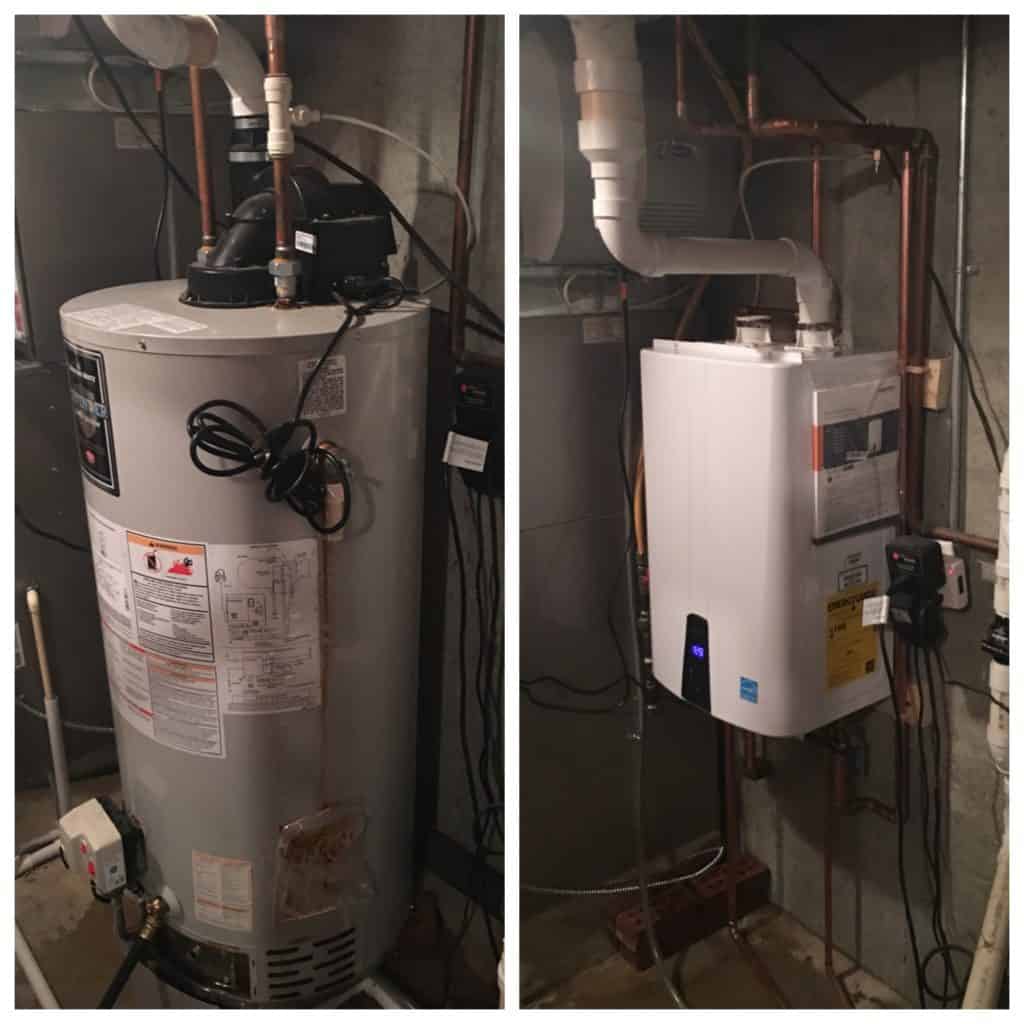
Water Heater Replacement vs. Repair
There are a number of factors that can determine the cost. One of the most important issues is whether you get your hot water heater repaired or replaced.
A good rule of thumb is that water heater’s life expectancy is 9 years. Without draining, water heaters that receive heavy use may not last quite as long. But 9 years is a good number to keep in mind.
If your water heater is more than 9 years old, and it starts giving you trouble, it will almost certainly be more cost-effective to replace it. Repairing it may be possible, but it could turn out to be just a short-term fix.
Another way of looking at it: If your unit is under seven years old, you will almost always want to repair it. Replacement probably won’t be necessary. But if your water heater is over seven years old, that’s where things get tricky. While it may be possible to repair it, it may or may not make financial sense to do so.
A skilled plumber will be able to advise you on the best way to get your hot water working again, without breaking the bank. That will be one of the determining factors in the cost of addressing your water heater problem.
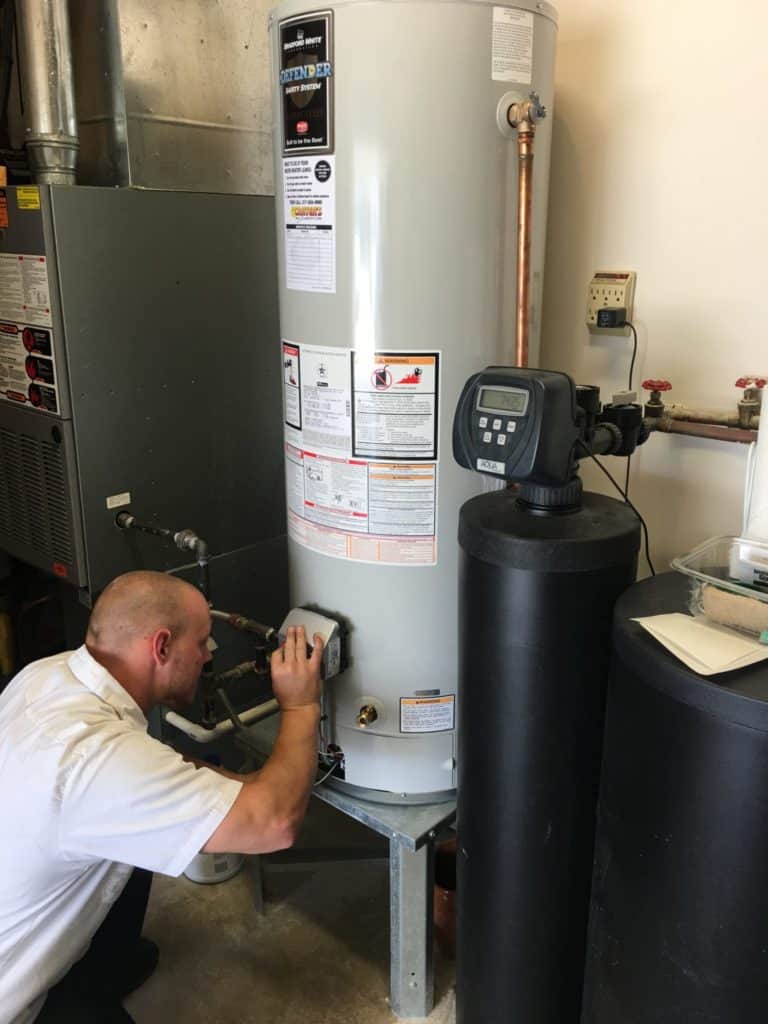
Common Problems That Leave You Without Hot Water
Something else to consider as you debate water heater repair or replacement cost: What’s the underlying problem?
There are several common problems that can cause a water heater to function suboptimally. Sometimes, it’s possible to assess for yourself what the issue is. Your plumber will be able to confirm your suspicions. Once an accurate diagnosis is made, you’ll have a better sense of the cost you’re looking at.
In this section, we’ll outline some of the typical problems that cause water heaters to fail.
1) You’re getting too little hot water.
One of the most obvious problems is that you’re just not getting enough hot water. One possible reason is that the unit is undersized. Hot water heaters come with different tank sizes to accommodate different sizes of house/family. If you consistently have too little hot water, it may be because your heater is just too small. Replacing it with a larger unit may be the best way forward.
Another possibility is that you need to adjust the thermostat. If you’re not getting enough hot water, it may just be because you have the temperature dial on the wrong setting. This is a very easy fix.
Note that sometimes it’s wise to turn the thermostat up when the outside temperature falls. That’s because the hot water is more likely to cool as it travels through the pipes to the faucet or fixture.
Any time you adjust the temperature on your water heater, be careful to make only light adjustments. You don’t want to turn it too high and risk burning yourself.
Another possible fix: Test the temperature pressure relief valve. This is a part of the water heater that keeps pressure from building in the boiler. Lift or lower the handle to let extra water drain out. If this doesn’t work, you may need to have a new pressure relief valve installed. This is a task for a Carter professional plumber.
Another issue to consider is the dip tube, which supplies cold water to the unit. Sometimes, these tubes can become cracked or broken. When this happens, cold water mixes with the hot water. This tube can be replaced by a professional plumber. If the water heater is old, you may want to replace the whole thing.
2) You’re not getting any hot water at all.
What does it mean when your unit isn’t supplying any hot water whatsoever?
First, consider whether yours is a gas-powered water heater. If so, then the issue you’re looking at it probably gas related. It could be that the pilot light is faulty and needs to be replaced.
If you have an electric water heater, the problem is likely with the heating element. Replacing a water heating element is a relatively small job. This is something a Carter plumber can help you with. Then, you’ll be back in business, with more than enough hot water.
3) Your water looks weird or smells funny.
Sometimes, water heaters can yield water that has an unusual aroma to it. Likewise, your water may come out looking discolored. Both are causes for worry, but what are the underlying issues? And how can they be fixed?
The issue may be with the water source. Pay attention to the smell and/or discoloration. Do they happen only with cold water? If so, then it’s a water source issue. You can fix this problem by installing a whole-house water filter. You’ll likely need a professional plumber to help with this.
But what if the problem is exclusively with hot water? If that’s the case, then the issue is with your tank. Something inside has started to corrode. There may be a reaction between the anode rod and sulfur in the water.
Here are some simple steps for addressing this problem:
- Turn off your water for a few minutes. Turn off the water supply for 15 minutes. Turn it back on. See if the smell or discoloration go away.
- Drain the tank. You may also wish to drain your water heater tank. Again, see if this gets rid of the smell and discoloration.
- Replace the anode rod. If all else fails, hire a plumber to replace the anode rod. This should solve the problem.
A related issue: What if your hot water has a garlic-like odor? This may suggest a problem with your pilot light. Turn off the gas control valve. Wait for the gas to dissipate. Then, reignite your pilot light. If this doesn’t work, turn off your gas supply and open windows or doors for ventilation. Call a Carter plumbing company or the gas company right away!
4) Your tank makes a lot of noise.
What does it mean when your water heater tank makes a lot of racket? A noisy tank could point to a few potential problems. Chances are, you’re dealing with one or more of these issues:
- Parts inside the tank have either contracted or expanded.
- Minerals and hard water scales have built up inside the tank.
There are a couple of ways to remedy this. First, have a magnesium or aluminum anode rod placed at the top of the tank. And second, make sure you’re in the habit of draining your tank 1 time per year minimum.
Now, you may sometimes hear what sounds like a boiling noise coming from your unit. This is a different kind of hot water heater problem. What it means is that your unit is overheating. You may have a dangerous build-up of pressure. Make sure you call a plumber ASAP to look at it.
5) Your water heater has sprung a leak.
Do you have a leaky water heater? If so, you’ll likely know it soon. Water will quickly spread out across your garage or utility room. (Or wherever you keep your hot water heater.)
Leaks tend to happen to units that are old and on their last legs. Most of the time, the issue cannot be repaired. You’ll just need to have the unit replaced.
To prevent flooding, you may want to turn off the water supply. And, make sure you call a professional plumbing company ASAP.
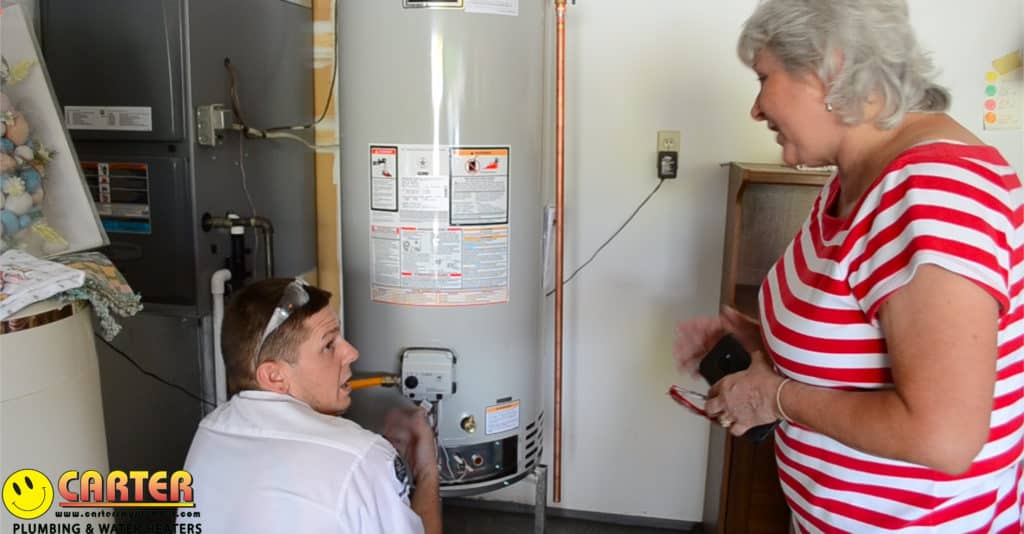
How Much Should You Spend to Repair a Water Heater?
So far, we’ve been discussing problems common to water heaters. The first step toward addressing your issue is to figure out what’s causing it. A Carter professional plumber can assist you with this.
Next, you’ll need to think about heater repair vs. replacement. Use our previous guidelines to help with this. To recap:
- If your unit is under seven years old, you’ll likely want to repair it.
- If it’s more than 9 years old, you should replace it.
- If it’s somewhere in between, get a recommendation from your plumber.
As you consider water heater repairs, there are several factors that can impact the price. Here are just a few aspects to think about.
- Cost of labor. The pricing of water heater repairs can be variable. One of the big factors is cost of labor. A plumber may charge as little as $40 hourly. Or, they may charge more than $150. Repairing a heater usually takes two hours or less. However, this too can vary by the nature of the repairs.
- Make and model. The make and model of your unit also come under consideration. Some units are simply more expensive. Their replacement parts may also be on the pricier side. This accounts for some fluctuation in repair costs.
- Quality of work. It’s good to look for an affordable plumber. Find someone who will give you a bargain. But also remember that quality counts. A more experienced and reputable plumber may charge a little more. Paying a low price to a bad plumber isn’t always a bargain. After all, you may wind up with an issue that recurs.
These are just a few of the factors that can determine the cost of water heater repairs. Of course, the biggest factor of all is which part needs to be repaired or replaced. That’s what we’ll discuss in the next section.
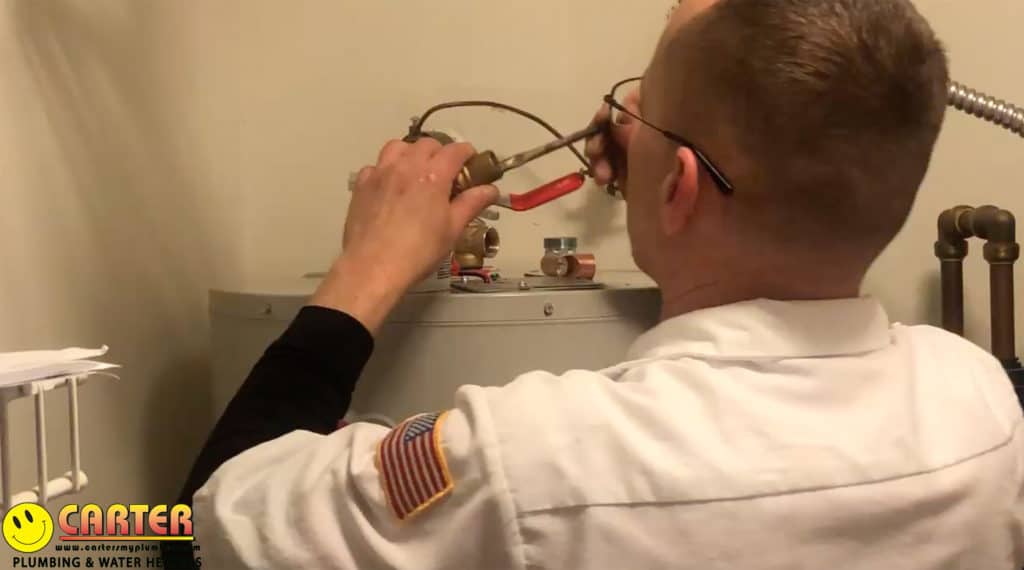
How Much Does It Cost to Repair or Replace a Part?
When you have your electric unit repaired, it will usually involve one of five major components:
- Heating element
- Thermostat
- Anode rod
- Dip tube
- Pressure relief valve
We have touched on each of these components already. Some repair jobs may involve other parts of the water heater. However, 90 percent of the time, the issue will be with one of these parts.
Heating Element
If you have a problem with your element, it will probably cost between $200 and $300 to fix it.
Most electric water heaters come with two heating elements. One is at the bottom of the tank. The other is positioned at the top of the tank.
An electrical current run through each element. This causes them to heat up. In turn, this heats the water inside the tank.
Various things can cause the elements to stop working. Over time, they may burn out. They may also become shorted. Often, bad elements will cause your circuit breaker to trip. If you often must flip the breaker back on, that may indicate a bad heating element.
The good news about elements is that they usually only cost $20 or so. Replacing one takes time, which means there is likely to be a higher cost of labor. You may spend up to $300 total. In most cases, this will be a long-lasting repair. Element replacement isn’t something you should have to do too often.
Thermostat
You may also run into problems with the thermostat on your unit. The cost to repair or replace one is usually $150 to $200.
Most heaters actually have two thermostats. Each one corresponds with one of the elements. If either thermostat goes bad, the water won’t heat as efficiently.
The lower-most thermostat handles most of your water heating. If you have an especially big load of hot water, the upper thermostat will kick in. If either one goes out, you could notice that your hot showers don’t last as long. Or, there may be too much cold water mixed in with the hot water.
Again, the parts themselves are inexpensive. A replacement thermostat will only run $20 to $30. Once labor is taken into account, you’re probably looking at $200 or so. (Again, please keep in mind that these numbers reflect general estimates, not guarantees.)
Anode Rod
Sometimes, heaters fail due to mechanical issues. But sometimes, it’s simple wear and tear. Over time, units become corroded. If your unit is visibly corroded, it may be too late to save it. You may need to go ahead and spring for a replacement.
Anode rods actually prevent corrosion. They extend the life of your unit. The average anode rod will last about five years. It should be replaced to help keep your unit safe against erosion.
An anode rod costs about $50. Some homeowners may feel comfortable replacing it themselves. If not, call a professional plumber, who can assist. The cost of having it replaced professionally may be around $250 or $300.
Dip Tube
A faulty dip tube may cause your heater to stop working. Replacing one yourself may cost as little as $10. If you have it done by a professional plumbing company, you can expect to pay around $150.
What is a dip tube, exactly? This is the pipe that transfers cool water from the top of the tank, back down to the bottom. There, it can be reheated by the lower element. Over time, this tube can get worn out. It may even spring a leak. If this happens, cool water will be mixed in with hot water. This reduces the overall water temperature.
This is another instance where the part itself is not too pricy. Most of the time, this is a simple and straightforward repair.
Pressure Relieving Valve
Finally, we come to the pressure valve. This is another small part of the heater that can sometimes fall into malfunction. Repairing this can cost anywhere from $20 to $200.
This valve does exactly what its name suggests. It releases excessive pressure from your tank. If the valve breaks, the tank may begin to leak.
There are different factors that could cause the valve to go bad. Sometimes it just gets worn down. In other cases, it may have too much sediment build up. Either way, this is usually a matter to be handled by a professional.
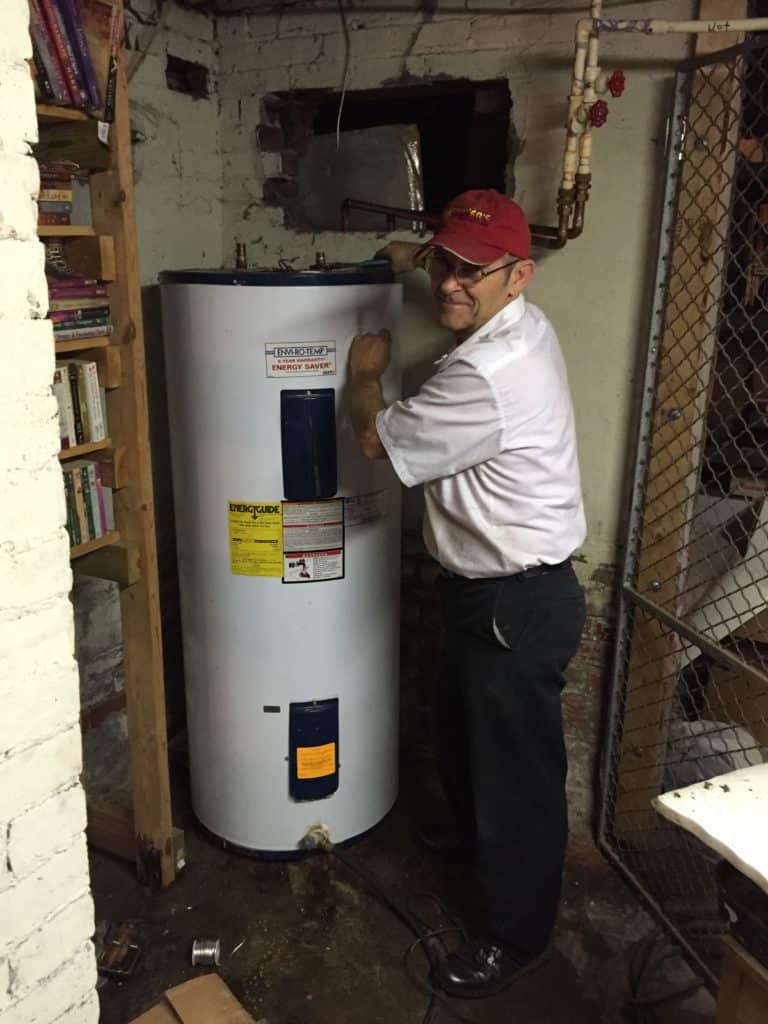
What About Issues with Gas Heaters?
So far, we’ve primarily focused on water heaters that are powered by electricity. However, gas water heaters can present their own issues and concerns.
When gas heaters have issues, they are usually related to the power source. Specifically, a gas heater may run into issues with any of the following components:
- Thermocouple
- Pilot light
- Gas control valve
Gas water heaters can be a little more difficult to assess than electric water heaters. If your gas heater is not working, you may want to hire a professional plumber. Your plumber will be able to accurately diagnose the underlying issue.
As for the average cost of gas heater assessment, here’s a brief rundown.
The Cost of Relighting the Pilot Light
It’s not uncommon for a water heater pilot light to go out. This can result from a temporary disconnection of the gas. Additionally, a pilot light can blow out over time. A plumber can help reignite the pilot light. They will charge you an hourly fee of $40 to $150. This is usually a fairly brief project, and may just take an hour.
You may wish to save yourself a few dollars by relighting the pilot light yourself. Only attempt this if you can completely follow the safety manual that accompanies your water heater. There are real dangers to playing with gas water heaters without the right precautions.
If you attempt to relight the pilot light and it doesn’t work, there may be another problem. Most likely, this is a problem with your thermocouple or gas control valve. See below for more information about these potential repairs.
The Cost of Replacing the Thermocouple
Thermocouples serve a simple purpose. They detect whether the pilot light is lit. This in turn releases the gas control valve. Essentially, this just turns on the gas.
If the thermocouple doesn’t work, it won’t be able to detect the pilot light. As a result, it will not be able to release the gas. If you have a faulty thermocouple, it will be impossible to reignite the pilot light.
If your thermocouple goes bad, there is only one thing to do: Replace it. If you hire a professional plumber to do this, it may cost up to $200 for the labor.
This is another repair you may wish to attempt on your own. The part itself should cost around $120 – $130+. If you attempt this, make sure you shut off the gas before you get to work.
The Cost of Replacing the Valve
Finally, we come to the valve. What is the average cost of replacing the gas control valve? This is one of the more expensive fixes for a gas heater. It may cost between $300 and $500.
A couple of notes: One, this is a harder task than the two we previously mentioned. It’s less likely that you can do it on a DIY basis. Two, if you have a malfunctioning valve, that means your unit is dangerous. We recommend shutting off the gas supply. Then, call a plumber right away. This qualifies as an emergency service need.
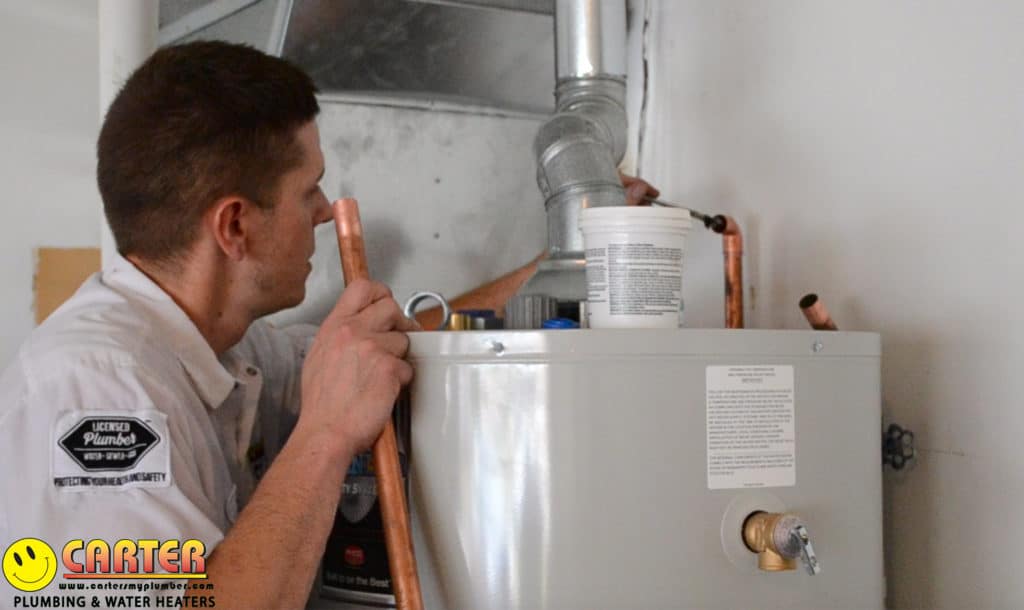
Additional Considerations for Water Heater Maintenance
As we come to the end of our guide, there are a couple of additional points to address. Understanding these points can make you a more responsible water heater owner.
Flushing Your Water Heater
Through daily use, your tank may accumulate debris and sediment. Over time, this sediment builds up. Eventually, this impedes your unit from working the way it’s supposed to. If your heater becomes noisy, that might mean there’s a sediment build-up.
You can avoid this problem by draining your tank on a regular basis. This is pretty easy to do. Most tanks will have a release valve where you can eliminate surplus water and sediment. Check out your owner’s manual for instructions on how to do this safely.
It’s recommended that you flush your tank at least once each year. If you notice sluggish performance, consider draining it more frequently.
If you are not comfortable draining the tank by yourself, you can hire a plumber. This is easy work, and a plumber will usually do it promptly. You’ll just need to pay their typical hourly rate.
One way or the other, be sure you attend to this key maintenance task.
Choosing a Replacement Water Heater
In some instances, it doesn’t make financial sense to repair your unit. We’ve mentioned this already: If your heater is close to the 15 year mark, it may be smart to replace it.
As you consider a new water heater, you’ll have several decisions to make. Not all water heaters are created equal. one decision you’ll need to make is whether you get a tankless water heater or one with a tank.
Both types of heater perform the same basic function. Namely, they supply your household with hot water. They go about it in different ways. A heater with a tank will store a certain capacity of hot water. Usually, this is 40 or 50 gallons. A tankless water heater doesn’t store water. Instead, it quickly heats water on demand, though a system of heating coils.
The average cost of tank-style installation is $1100 for a 40-50 gallon unit. Of course, this can change if you opt for a much larger size. The average cost of a tankless installation is closer to $3,500.
When thinking about your new water heater, there are several considerations to keep in mind.
Tank Heaters
- PRO: It’s much less expensive than a tankless heater.
- PRO: Installation is much quicker.
- PRO: The tank can handle a large volume of water.
- CON: It’s not as energy efficient, as it heats water even when you’re not actually using it.
- CON: The tank occupies more physical space in your house.
- CON: To install it, you need an indoor location with an elevated platform.
- CON: Tank-style heaters usually don’t last quite as long as tankless ones do.
Tankless Heaters
- PRO: Tankless heaters are much more energy efficient. In fact, they can save you up to 25 percent on your annual water bill.
- PRO: Tankless heaters experience just 5 percent energy loss, compared to 30 percent for tank-style ones.
- PRO: You’ll always have hot water when you need it.
- PRO: You can install a tankless heater almost anywhere, even outside.
- PRO: Tankless heaters tend to last longer, sometimes up to 20 years.
- PRO: Tankless heaters take up less physical space.
- CON: They are much more expensive on the front end.
- CON: Installation is more complex and time consuming.
- CON: Some homes may require multiple tankless water heater units. This is obviously a more significant expense.
For more details please visit our tankless water heater installation cost article.
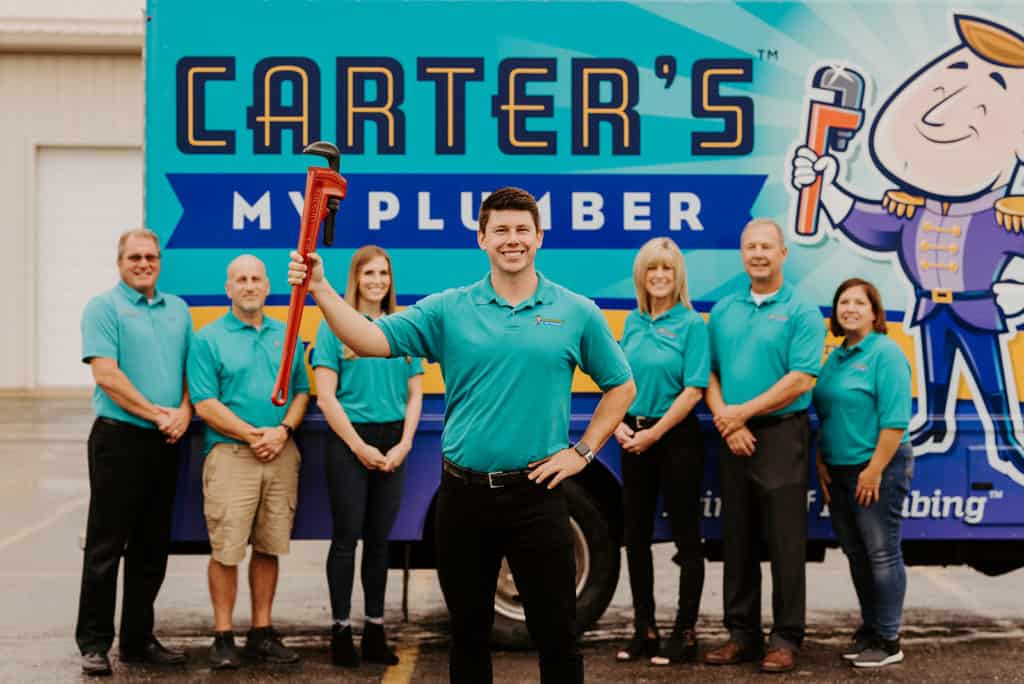
Hire a Water Heater Replacement and Repair Company in Indianapolis area
The bottom line: Homeowners depend on functional water heater units. If your water heater goes out, it diminishes your quality of life considerably. Prompt water heater replacement or repair is a must.
Do you have a water heater that needs to be repaired or replaced? Or do you have further questions about the cost of water heater repair work? Contact Carter’s My Plumber to speak with us about repairing your old water heater. Or, ask us about getting a new water heater! We provide water heater repair in Indianapolis, water heater repair in Greenwood, IN, Fishers Indiana, and Carmel Indiana.



